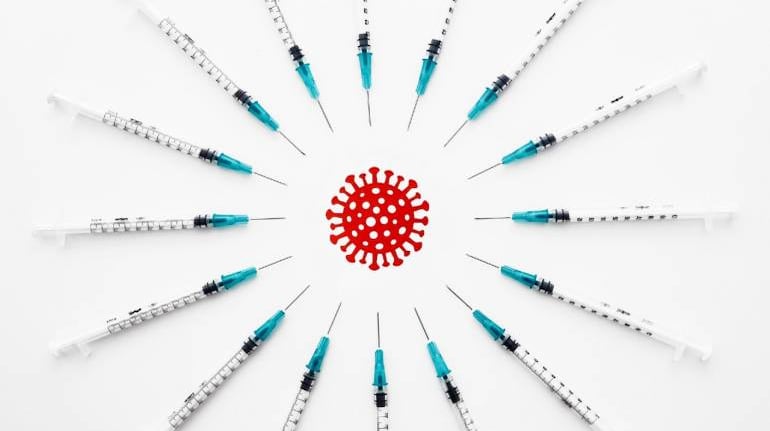Omicron news roundup: All the important developments about the Covid variant you must know
New drugs in WHO’s Covid-19 arsenal, quarantine worries and a country shaken by protesting teachers, in today’s roundup of events across the world.
January 14, 2022 / 12:03 IST
Baricitinib and sotrovimab: WHO clears two new drugs for Covid-19 treatmentThe World Health Organisation has added baricitinib and sotrovimab to Covid-19 treatment protocol. The first is usually used to treat rheumatoid arthritis and the second is an experimental monoclonal antibody drug, which bolsters the body’s defence mechanism.Why is it important?With countries caught in the Omicron-driven wave, WHO’s action reflects the urgency required to contain the spread. Baricitinib can reduce the need for ventilation support and its generic version is available in India. Sotrovimab is recommended only for those at highest risk of hospitalisation, which could then reduce the strain on the hospital system.Quarantine periods may need to be longer for Omicron, data from Japan indicatesData from Japan’s National Institute of Infectious Diseases shows that the most viral load is shed after three to six days of Omicron-infection detection. This means those Covid-positive from this variant will be infectious for longer and that they would need longer quarantines. Why is it important?This is particularly significant when countries are trying to cut down isolation periods, to protect their economies. With long quarantine requirements, countries are facing labour shortages even in emergency services and supply-chain disruptions. Japan itself is considering shortening the isolation period for primary contacts from 14 to 10 days.US Supreme Court stops Biden’s attempt to mass vaccinate corporate employeesThe court stayed the US President Joe Biden’s government attempt to get employees of businesses mandatorily vaccinated and tested on a weekly basis. Using the Occupational Safety and Health Administration (OSHA) rule, which allows the government to step in and regulate working conditions of businesses, the Biden administration had wanted companies who employ more than 100 people to follow this protocol. The court found such a use of the rule unprecedented and excessive.Why is it important?Governments across the world are trying to manage the spread of the highly infectious Omicron wave. Many administrations are struggling to find a balance between rights of the community and rights of the individual/entity. The US, which has had the highest recorded pandemic death toll in the world, with 8,45,000 fatalities, is also seeing its citizens divided on the Covid-19 protocol. A part of the population sees the rules–on usage of masks and vaccinations–as denial of personal liberty.French teachers stage mass protests against ‘confusing’ Covid-19 rulesThe French government estimates that 40% of primary teachers and 24% of secondary teachers walked out, to protest the handling of the Covid-19 crisis. The teachers have said that the rules are confusing and constantly changing.Why is it important?It is said to be the largest mobilisation of teachers in decades. Over 11 teacher unions have organised the protests, which are causing the closing of schools across the country. Also, the French presidential election is just a few months away and such large-scale display of dissatisfaction can cost Emmanuel Macron heavily, especially after the much-hated, strict pandemic and vaccination rules.Environmental group raises concern about plastic waste from quarantining in Hong KongThe Green Earth has said that pieces of disposable plastic, used by people quarantining in Hong Kong, has already surpassed 100 million. People entering the region have to quarantine for 21 days in designated hotels.Why is it important?With quarantining the norm everywhere, increase in plastic waste is going to be a concern going ahead. Medical experts discourage the recycling of this plastic, for fear of spreading the infection wider. A research paper published last year in the Journal of Chemical Engineering noted that plastic waste was set to increase two fold by 2030 even before the pandemic hit. With the pandemic needing quarantining, use of disposable cutlery and use of personal protective equipment, the use of plastic is set to escalate.Reduced hospitalisation risk from Omicron, says another studyNearly 70,000 Covid-positive people were part of the study done in the US, which found that the Omicron-infected were only half as likely to be hospitalised. Key findings- Omicron-infected 75% less likely to need intensive care and 90% less likely to die.
- Hospital stays averaged 1.5 days, when they averaged 5 days for Delta.
- Reduction in severity of disease not only from increased vaccination, but also from the nature of the variant itself.
Key events in India- UN report warns India about episodes “similar” to the “deadly wave of infection with the Delta variant” that took 240,000 lives between April and June.
- Daily test positivity rate higher than 10% in 21 states and UTs; highest in Goa (31.84%), West Bengal (30.86%) and Delhi (26.22%)
- New cases highest in 236 days; over 2.64 lakh new infections reported
- Rajasthan CM Ashok Gehlot says sero surveillance found 90% of people in the state have developed immunity against Covid-19. He added that vaccination was still necessary.
- Kolkata Police raises ‘fraud alert’ over people offering booster shots. The police said that phone calls or messages promising the shots could be a way to steal banking details such as OTP, by encouraging the users to click on a link sent with the message.
- Ficci asks for the quarantine period to be reduced to five days, to deal with labour shortage.
Discover the latest Business News, Sensex, and Nifty updates. Obtain Personal Finance insights, tax queries, and expert opinions on Moneycontrol or download the Moneycontrol App to stay updated!



